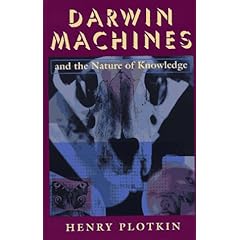
While I was looking at Amazon's page on Darwin Machines and the Nature of Knowledge by Henry Plotkin, I found a few more books I'd like to read.

The Hand: How Its Use Shapes the Brain, Language, and Human Culture by Frank R. Wilson
From Publishers Weekly
Neurologist Wilson (Tone Deaf and All Thumbs?) gathers arguments from anthropology, psychology and medicine, along with the personal stories of musicians, backhoe operators, puppeteers and prestidigitators, to demonstrate the centrality to intelligence of our human hand. His account of the coevolution of hand and brain through our primate ancestors is fascinating, and the science he sites is rigorous and profound. The insights along the way are startling to the layperson even if old news to savants. For example, the size of a primate's neocortex is proportionate to the size of its maximum stable social group (our own being about 150). The emphasis throughout is on "the interaction of the biologic and social processes," as, for example, an artist, from early childhood, finds her way toward her instrument, and also as the species itself evolves over millennia, starting, as Darwin observed, with the freeing of the upper limbs by our descent from the trees. Out of the analysis of intelligence as fundamentally somatic there emerges a critique of educational theory. Wilson is a passionate advocate of process-centered teaching with attention to individual intelligences. Despite absorbing material and an ultimately cogent and important argument, his book dwells too long on inessential details of the case histories, and it sometimes loses steam in scholarly discourse; also, the organization into short, pithy chapters obscures the structure of the whole. Thus, although their work is rewarded, readers have to labor a bit too hard to tie the argument together. B&w illustrations throughout.
Copyright 1998 Reed Business Information, Inc.

How We Got to Be Human: Subjective Minds With Objective Bodies (Hardcover)
by William H. Libaw
From Publishers Weekly
In this freewheeling, unorthodox study of human origins and behavior, science writer Libaw argues that while females abandoned estrus (periodic itch for sexual activity) as they evolved from upright apes to human beings, males genetically retained animal rut and expanded it into year-round endless lusting for sexually receptive females. In this scenario, males invented courtship and foreplay to interest and hold estrus-free females; meanwhile, hominid Lucy learned that her sexuality was valuable to males, a convertible bargaining chip, and patriarchal culture, combined with genetic inheritance, made men more promiscuous than women. Libaw wages a running irreverent critique of the ideas of Stephen Jay Gould, Marvin Harris, Richard Dawkins, Steven Pinker, Daniel Dennett, Roger Penrose, Jeffrey Masson and others as he tosses off heretic theories. Full-fledged spoken language, he believes, came first from the brains and mouths of a small community of young children and only later took root among adults, supplanting the proto-language adults used to perform cooperative tasks. Tweaking his nose at establishment science, Libaw contends that apes think about power and sex, and that the communicative gestures of chimps and some birds imply that animals experience some form of conscious mentation. But he rejects the idea (popularized by Masson) that lower animals and apes have reflective consciousness. Among the other hypotheses and proposals in this sometimes provocative grab bag: magic and religion were very close cousins millennia ago, then diverged; childhood is about getting love, not giving it; the out-of-Africa theory of human origins may be fatally flawed. Libaw attempts, audaciously and unconventionally, if highly speculatively, to pierce the subjective mental realm extending from animals to early humans to us. (Aug.)
Copyright 2000 Reed Business Information, Inc.

The Neurophysics of Human Behavior: Explorations at the Interface of the Brain, Mind, Behavior, and Information by Mark E. Furman, Fred P. Gallo
Product Description
How do brain, mind, matter, and energy interact? Can we create a comprehensive model of the mind and brain, their interactions, and their influences? Synthesizing research from neuroscience, physics, biology, systems science, information science, psychology, and the cognitive sciences, The Neurophysics of Human Behavior advances a unified theory of brain, mind, behavior and information. This groundbreaking work helps you more deeply understand, more accurately predict, and more effectively change human behavior - a significant contribution to the fields of psychology, education, medicine, communications, and human relations. Cognitive neurophysics, as detailed in this work, presents an integrated perspective of brain, mind, behavior, thoughts, and nature. The distinguished authors emphasize the need to view psychological science - and our image of the "self" - in the context of the physical world: matter, energy, and natural laws. NeuroPrint is the powerful application model of this perspective. This comprehensive, detailed algorithm defines the network of interactions that develop brain, mind, behavior, thoughts, and emotions and redefines the meaning of psychotherapeutic intervention. The Neurophysics of Human Behavior gives the background, tools, and methods for intervention and modeling. It outlines the systematic, behavioral approach of NeuroPrint, promising to promote a deep understanding of the process of human change. Using The Neurophysics of Human Behavior, practitioners and researchers can plot and gauge the paths of change in neurocognitive dynamics and the improvements in mental health.
Hi Binh- One of the books you mention here - How We Got to Be Human - was written by my father, Bill Libaw. I'd be happy to send you a copy for free if you'd like. I've got a couple extra copies at home here. Let me know!
ReplyDeleteCheers,
Oliver Libaw
oliver_libaw(at)yahoo.com
Hi Oliver,
ReplyDeleteThank you for offering to send me a copy of "How We Got to Be Human." I gladly accept, please let me reimburse you for the cost of postage.
I'll send my postage details to your email.
If you get a chance, I'd like to hear your thoughts on this topic.
Warm regards,
Binh Nguyen